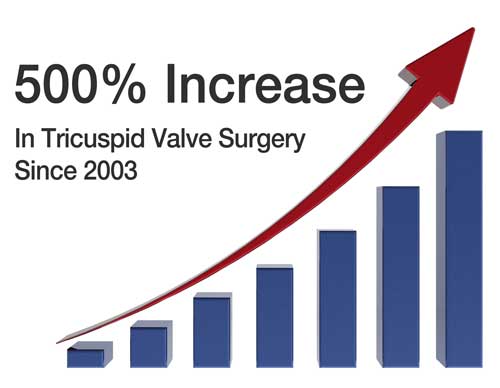Surgeon Q&A: The Rise of Tricuspid Heart Valve Surgery with Dr. McCarthy
Written By: Adam Pick, Patient Advocate, Author & Website Founder
Page Last Updated: May 10, 2025
You may have noticed that most patients in our community have been diagnosed with an aortic or mitral valve disorder. Recently, however, I’ve been contacted by several patients who have tricuspid valve defects.
As the tricuspid valve is often called the “forgotten valve” in medical literature, I wanted to help all patients learn more about the rise of tricuspid valve surgery. For that reason, I just filmed an educational video with Doctor Patrick McCarthy, a tricuspid valve surgeon from Northwestern Medicine.
I hope this video helped you learn more about the increase in tricuspid valve treatment in isolated cases and in concomitant mitral valve repair procedures. To learn more about tricuspid valve surgery, I encourage you to read “Evolving Trends in Tricuspid Valve Surgery”, an excellent research paper by Doctor McCarthy.
Written Transcript of Dr. McCarthy’s Video Interview
For the hearing impaired members of our community, I have provided a written transcript of Dr. McCarthy’s video below.
Dr. Patrick McCarthy says: I’m Director of the Bluhm Cardiovascular Institute here at Northwestern Medicine, and I’m the Chief of Cardiac Surgery. Over my career, I’ve done about 10,000 heart operations. About 5,000 are heart valve operations. I’m about half mitral valves and half aortic valves, but I also have a particular interest and experience in tricuspid valve surgery.
There was a time when I was doing as many as 100 tricuspid valve operations a year. In that stage in my career, I was doing a lot of patients with really advanced heart failure. These days, I’m doing a little different group. I’m doing very early stage patients and the valve is leaking for a different reason. So now, I probably do about 30 to 40 or 50 procedures each year.

Valve surgery, of all heart operations, it’s still a bit of an art and not just a science. No two are exactly the same. As you do more and more, you get more experience and you see more and more patients with it.
A leaky tricuspid valve gradually develops heart failure. The disease is quiet at first, but over time the patient develops heart failure symptoms. Specifically we call it, right heart failure symptoms, which is where patients get fluid in their legs, fluid in their abdomen. Patients are also short of breath. Also, it’s damaging to the heart. The heart isn’t contracting as well because the valve is leaking. The valve ought to be hitting together like this. The most common problem is just that it’s pulled apart. The annulus, as we call it, is dilated. So, all we do is we put a ring around it. That brings the leaflets back together so that the leaflets get back together properly.
About Mitral Valve Surgery & Concomitant Tricuspid Valve Surgery
If you were going through mitral valve surgery and they tell you that the tricuspid valve is also leaking some, then you just want to know that the surgeon is aware of that. You want to know how much it is leaking. On a scale up to four — where four is the worst — if it’s a three or four it should just be fixed. If it’s a two, we fix most of those these days. Even if it’s only a one out of four we’ll think about it under different conditions.
The Rise of Isolated Tricuspid Valve Surgery
There is a subgroup of patients that are not very common, but we’re seeing those more too, where all the other valves are working fine and the only problem they have is a leaky tricuspid valve. These days, we see it because people have a permanent pacemaker and the pacemaker wire goes through the valve and it can interfere with function of the valve. If you are one of those patients, that’s one where you want to pay attention to it because it may only be leaking two or three out of four for a while. But, over thousands and millions of heart beats, that can impact your heart function. So patients should be following that carefully and at some time you might need an operation for that.
Here at Northwestern for us, tricuspid, like atrial fibrillation is one of those things that we’re known to focus on and is one of the reasons that people are referred here, that patients choose to come here. There’s a lot more recognition on the part of surgeons that it should be addressed. In fact if you look at the data, tricuspids are like that. They’ve gone up five times just over the last ten years. Across the world people are paying more attention to it.
On behalf of the patients and caregivers in our community, I want to extend a special thanks to Dr. McCarthy for taking time out of his busy schedule to educate our patient and caregiver community about tricuspid valve disease and the surgical approaches to cure this disorder.
Keep on tickin!
Adam










